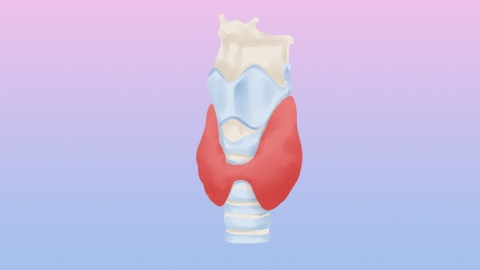What medications can be used for joint pain in patients with hypothyroidism?
Hypothyroidism, also known as underactive thyroid, generally causes joint pain in patients due to insufficient secretion of thyroid hormones, leading to slowed metabolism, increased viscosity of synovial fluid, or accompanied inflammatory reactions. Patients may follow medical advice to use medications such as levothyroxine sodium tablets, ibuprofen sustained-release tablets, celecoxib capsules, glucosamine hydrochloride capsules, and diclofenac sodium enteric-coated tablets for treatment. Detailed explanations are as follows:
1. Levothyroxine Sodium Tablets
Levothyroxine sodium tablets can supplement the deficient thyroid hormones in patients with hypothyroidism, correct thyroid function, and improve insufficient nutrient supply and accumulation of metabolic waste in joint tissues caused by slowed metabolism, thereby alleviating joint pain caused by thyroid dysfunction. The dosage should be adjusted according to thyroid function test results under a doctor's guidance and taken regularly over a long period.
2. Ibuprofen Sustained-Release Tablets
Ibuprofen belongs to nonsteroidal anti-inflammatory drugs (NSAIDs) and can inhibit prostaglandin synthesis, reduce joint inflammation, and alleviate joint pain and swelling. It is suitable for mild to moderate joint pain accompanying hypothyroidism. The sustained-release formulation maintains effectiveness for 12 hours and has relatively less gastrointestinal irritation.

3. Celecoxib Capsules
Celecoxib exerts anti-inflammatory and analgesic effects by inhibiting cyclooxygenase-2 (COX-2), thereby reducing the production of inflammatory mediators. It effectively relieves joint pain in patients with hypothyroidism, especially those who are intolerant to other NSAIDs, and can reduce gastrointestinal adverse reactions.
4. Glucosamine Hydrochloride Capsules
Glucosamine hydrochloride is an essential component of joint cartilage matrix synthesis. It can promote cartilage repair and regeneration, improve cartilage structure, and reduce pain caused by joint friction. It is suitable for joint pain related to cartilage damage accompanying hypothyroidism.
5. Diclofenac Sodium Enteric-Coated Tablets
Diclofenac sodium inhibits prostaglandin synthesis, effectively relieving joint inflammation and pain. The enteric-coated tablet formulation reduces irritation to the gastric mucosa and is suitable for moderate to severe joint pain accompanying hypothyroidism. Dosage can be adjusted based on pain severity, and it is primarily used short-term to relieve acute pain.
In daily life, attention should be paid to keeping the joints warm and avoiding cold exposure or excessive weight-bearing; gentle joint exercises such as walking and tai chi should be practiced appropriately, avoiding strenuous exercise; dietary intake of calcium and vitamin D, such as milk and soy products, should be increased to support joint health. At the same time, strict adherence to medical advice for thyroid function control is necessary to reduce triggers of joint pain.







